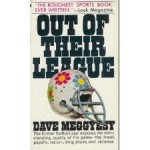The world of sports was much different 50 years ago. Professional athletes were not paid well, they did not receive benefits, and for the most part they were exploited by the owners. They were expected to display their talents on the field and not draw attention to themselves in the media.
There were a limited number of books about sports; most were either statistical overviews of past seasons or feel-good biographies about the most popular stars in the game. At that time athletes were heroes and role models and parents wanted their sons to be a gentleman like Lou Gehrig.
But the innocence surrounding the world of sports and athletics changed at the hands of Curt Flood and Dave Meggyesy.
In 1969, Curt Flood, centerfielder for the St. Louis Cardinals baseball team, refused to be traded and his claim ended up in the U.S. Supreme Court. He lost his case, but his actions unified baseball players in their fight against the reserve clause, which ultimately resulted in free agency.
In 1970, Dave Meggyesy, linebacker for the St. Louis Cardinal football team, penned the book Out of Their League. It was a disturbing, but necessary commentary about the dark side of football.
These gentlemen exposed sports and athletics as big business with a closet full of skeletons. Flood showed how athletes were taken advantage of financially. As a result of free agency the salaries of athletes have risen. As well, high-priced television contracts and payrolls, lockouts, and work stoppages have become too common. The bargaining table has become as important as the playing field and the scoreboard.
At the time, it was taboo to talk about the issues Meggyesy brought out in the open. Specifically he discussed the hypocrisy of college sports, racism, drugs and substance abuse, and brutality associated with football.
The following bullet points briefly touch on changes that have occurred in these areas since the release of Out of Their League.
• Hypocrisy of college sports – Over the years the NCAA has dictated that college programs have a greater focus on academics; proper physical and mental training; addressing drug and substance abuse; and injury prevention and care. Athletes are no longer dropped from programs if they become injured during their careers and tutoring is available when they need help in classes. The scandals of the past 10 years are testimony that college programs are drowning in hypocrisy, despite the best intentions of the NCAA. Genuine concern is shown for athletes, yet the unwritten goal of most programs is to win – fans and alumni don’t buy tickets or sponsorships to watch losing teams.
• Racism – Racism, as it existed among athletes during the 1960s, has declined significantly. Today, discussions about racism are more centered on discrimination, particularly the need for athletic programs to hire more minorities and women in the coaching and administrative ranks. Progress will continue to be made in hiring women and minorities.
• Drugs and substance abuse – As long as the scoreboard is lit and winners are rewarded, athletes will search for ways to legally or illegally improve their performance. Today athletes are tested for use of illegal and performance enhancing drugs. Although the process is not perfect, it has deterred some athletes from making poor choices.
• Brutality – Athletes have gotten bigger, stronger, and faster. As a result, the chances of severe injuries in football have increased. At the same time, greater attention has been given to proper training, drug prevention, improved equipment, and the care of injuries. As well, rules governing practice and the way the game is played have been changed to reduce injuries. Within the past decade former NFL players have drawn attention to the long-term problems associated with concussions and other injuries. As a result, concussion awareness and treatment programs have been put in place that benefit athletes in all sports at all levels.
Meggyesy’s book and Flood’s court case altered the way athletic teams and programs are financed and managed. As well, their actions brought about changes that cause fans to view their favorite teams and athletes much differently than fans viewed them 50 years ago.
